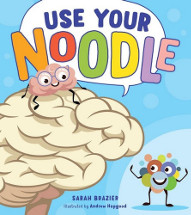Use your noodle by Sarah Brazier

Little Steps Publishing, 2020. ISBN: 9781925839517. Unpaged.
(Age: 8+) Highly recommended. Sarah Brazier and colour-loving
illustrator Andrew Hopgood create a factional text about the brain
that looks and feels more like a picture book. The author uses Tom
and Emma to demonstrate dual workings of our brain, ideal for shared
reading. We are introduced to Mind, who never shuts up. He's the
noisy, sensing, colourful, feeling and reactive one. For a friend,
his behaviour can certainly cause us a lot of anxiety and
embarrassment. Hopgood's flesh tone rendering of Noodle however,
shows us the bland, contemplative, reasoning brain, who helps us to
choose to be awesome. Hopgood aids young readers by highlighting
awesome words and instructions. When Tom and Emma are challenged
by their irrational feelings, they allow Mind's "fight or flight"
reflexes to take over. To be their best selves, both are advised to
consult Noodle and analyse each situation before making rash
decisions. The delightful thing about Use your noodle is not
to denigrate our amazing emotions with unique thoughts and
experiences. But Brazier wants us to consult someone else, a
different inner self, aka Noodle, and that makes all the difference.
It is not surprising that the hat tip to both academic and spiritual
thinkers concludes the book, since the takeaway is to balance our
"two" brains, making sure that Noodle has the time to convince us of
the best outcome. But the message doesn't end there with the
absolutes of neuroscience - the most important message is saved for
last . . .
"There is only one special you. Only you have your mind and your
noodle. No one will ever know exactly what you are thinking, and you
won't know what someone else is thinking. So try not to worry about
what others do. Just treat other people as you would like them to
treat you."
Fans of Hey warrior by Karen Young, will think this
instructional text ugly by comparison, but Use your noodle
targets all young readers, and many adults too, whose compulsions
are not restricted to clinical anxiety.
Deborah Robins